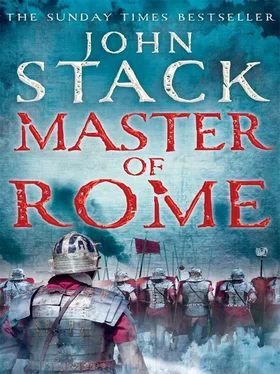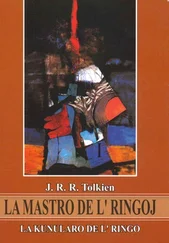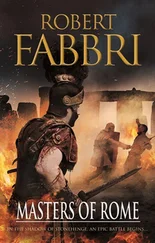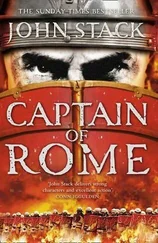John Stack - Master of Rome
Здесь есть возможность читать онлайн «John Stack - Master of Rome» — ознакомительный отрывок электронной книги совершенно бесплатно, а после прочтения отрывка купить полную версию. В некоторых случаях можно слушать аудио, скачать через торрент в формате fb2 и присутствует краткое содержание. Жанр: Исторические приключения, на английском языке. Описание произведения, (предисловие) а так же отзывы посетителей доступны на портале библиотеки ЛибКат.
- Название:Master of Rome
- Автор:
- Жанр:
- Год:неизвестен
- ISBN:нет данных
- Рейтинг книги:4 / 5. Голосов: 1
-
Избранное:Добавить в избранное
- Отзывы:
-
Ваша оценка:
- 80
- 1
- 2
- 3
- 4
- 5
Master of Rome: краткое содержание, описание и аннотация
Предлагаем к чтению аннотацию, описание, краткое содержание или предисловие (зависит от того, что написал сам автор книги «Master of Rome»). Если вы не нашли необходимую информацию о книге — напишите в комментариях, мы постараемся отыскать её.
Master of Rome — читать онлайн ознакомительный отрывок
Ниже представлен текст книги, разбитый по страницам. Система сохранения места последней прочитанной страницы, позволяет с удобством читать онлайн бесплатно книгу «Master of Rome», без необходимости каждый раз заново искать на чём Вы остановились. Поставьте закладку, и сможете в любой момент перейти на страницу, на которой закончили чтение.
Интервал:
Закладка:
‘And the centre?’ Atticus asked.
‘After our horse fled, the Carthaginian cavalry attacked the right flank and swept around the rear. Some of the hastati broke through the elephant charge, but they were swallowed by the enemy infantry, and the bulk of the legions were trapped by the cavalry. We re-engaged on the right and the proconsul broke out with maybe five hundred men, but they were isolated and surrounded again and we were pushed back, so I ordered a fighting retreat.’
‘You fled and left the legions trapped?’ Septimus said, rising to his feet, his fists balled by his side.
‘There was nothing we could do,’ Salinator replied, standing to face down Septimus. ‘If we’d stood our ground we would have been slaughtered like the legions.’
‘So you ran,’ Septimus said contemptuously, ‘and saved your own skin.’
‘Enough!’ Atticus shouted, and stood to lean between the two soldiers. He turned to Salinator. ‘Did you see the proconsul fall?’ he asked.
The Etruscan tore his eyes from Septimus and looked to Atticus, the anger in his eyes never abating. ‘No,’ he replied after a moment. ‘I think he was captured but I can’t be sure.’
‘What does it matter?’ Septimus said, turning away from the table, concern for the Ninth overwhelming him.
‘Were you pursued?’ Atticus asked.
‘I don’t think so,’ Salinator replied and, looking at Atticus, he spoke aloud a thought that had plagued him during his flight from the battle. ‘But with the legions destroyed, nothing stands between Tunis and here.’
Atticus nodded and walked from the table. Salinator sat down again, his gaze moving to Septimus, his mouth creased in anger once more.
Suddenly a clarion call of alarm sounded, followed by another and then another, until they overlapped to form a continuous sound.
Salinator shot up once more, panic in his face. ‘We were followed; the Carthaginians are attacking.’
‘No,’ Atticus said, his expression equally dread-filled, but for another reason. ‘Those are naval horns.’ He rushed to the door, pushing it open to run outside, his eyes blinking rapidly in the sunlight after the gloom of the interior. His gaze swept the seaward horizon. He felt Septimus come out to stand beside him, but his focus never left the fearsome sight that had prompted the sound of alarm from the galleys of the fleet. Atticus instinctively reached for the hilt of his sword.
‘Poseidon protect us…’ he whispered, and he broke into a run as he headed down to the shoreline, calling to the nearest galley to launch its skiff. In the distance, the dark-hulled Carthaginian galleys continued to deploy across the mouth of the harbour, their number already exceeding a hundred, the windblown waves dashing against their rams as their oars crashed endlessly into the restless sea.
Marcus Atilius Regulus straightened his back as he heard footsteps approaching the door, the proconsul drawing himself to his full height in the darkened, airless room. He stepped into one of the shafts of sunlight permitted by the shuttered window, feeling the sweat roll down his back in the infernal heat. He blinked a bead of moisture from his eye. Regulus was nearing fifty years old but his body was that of a younger man, the harsh campaigning of the previous twelve months having stripped his frame of the softness that had accumulated over many comfortable years in the Roman Senate.
He was thirsty, the meagre amphora of brackish water he had been given the night before long since gone, and he licked his lips to moisten them, conscious that his first words should not be spoken with a cracked voice. He watched the door shudder as a harsh metallic sound cut through the near silence; the room was flooded with harsh sunlight as the door was opened. Regulus squinted against the light but he resisted the urge to wipe the blindness from his eyes, instead staring directly ahead to the two figures facing him. They were both soldiers, but senior in rank, their bearing revealing the arrogance and confidence of command.
The younger man entered first. He was Carthaginian, his uniform of the style that Regulus had come to loathe over the previous months. He looked the proconsul in the eye, staring at him as if in fascination, studying him, and Regulus returned the gaze, suddenly conscious of the soiled, sweat-stained tunic he was wearing. The other man stepped in. He was taller than the Carthaginian, his skin a paler complexion, and his gaze wandered the room before settling on the Roman, a half-smile of disdain creasing the edge of his mouth.
‘You are Regulus,’ the Carthaginian said; more a statement than a question, but the proconsul nodded in reply regardless.
‘I am Hamilcar Barca,’ the Carthaginian continued. ‘And this is Xanthippus.’
Regulus held his tongue, taking the moment of silence to study the men anew. He had heard their names many times over the course of the year-long campaign — from ally and captured foe alike. Hamilcar Barca was the overall commander of the Carthaginian forces, and Xanthippus, the Spartan mercenary, hired to command their army after their overwhelming defeat at Adys over a year ago, the man who had given the enemy victory only two days before at Tunis.
‘What of my men?’ Regulus asked, speaking for the first time, his voice low and hard in an effort to instil authority in his question.
‘Sit down,’ Hamilcar replied, indicating the single chair against the far wall.
Regulus glanced over his shoulder but remained standing. He stared into the Carthaginian’s face, keeping his expression unreadable. Hamilcar stepped forward.
‘Sit down,’ he repeated menacingly. ‘Or I will have my men come in and strap you to the chair.’
Regulus hesitated a second longer and then moved slowly to the far wall, sitting down in one fluid movement as if by choice.
Hamilcar smiled, although the gesture did not reach his eyes. ‘For now your men are in the prison beneath this fortress,’ he replied, his eyes never leaving those of the proconsul’s. ‘I have not yet decided their fate.’
‘They are soldiers captured in battle,’ Regulus said, leaning forward. ‘Their lives must be spared.’
‘They are Roman,’ Hamilcar shot back. ‘And their lives are forfeit to the whim of Carthage.’
Regulus made to retort but again he held his tongue, sensing that to antagonize the Carthaginian further was to risk the lives of the five hundred legionaries who had been captured with him. He repeated the number in his mind. Five hundred out of an army of twelve thousand. He whispered a prayer to Mars, the god of war, as he struggled to keep the burden of the terrible loss hidden from his enemy.
‘You are defeated, Roman,’ Hamilcar said, as if reading Regulus’s thoughts. ‘Your army is no more and your invasion is finished.’
‘Is that why you have come here, Carthaginian?’ Regulus retorted. ‘To tell me this. To mock me?’
‘No,’ Hamilcar replied, stepping forward once more until he stood over Regulus. ‘Your light infantry escaped our grasp at Tunis and have fled to Aspis. I have come here to demand you order those forces to surrender.’
‘Surrender?’ Regulus scoffed. ‘The fleet at Aspis will already have evacuated them. There will be no surrender.’
‘You are wrong, Roman,’ Hamilcar replied, the arrogance of the proconsul stirring his anger. ‘The port is blockaded and your fleet is trapped, and if you do not order those men to surrender, I will kill every last one of them.’
Regulus was stunned into silence, his mind racing to devise an alternative.
‘You have until tomorrow to decide,’ Hamilcar said, and he turned and left the room, Xanthippus following without a backward glance.
Regulus stood up as the door was closed, the room once more plunging into semi-darkness. He breathed in deeply, trying to clear his thoughts, but the warm air caught in his throat and he coughed violently. He reached out instinctively for the amphora and picked it up, remembering immediately that it was empty, and he threw it at the wall in anger, the clay shattering into a dozen pieces.
Читать дальшеИнтервал:
Закладка:
Похожие книги на «Master of Rome»
Представляем Вашему вниманию похожие книги на «Master of Rome» списком для выбора. Мы отобрали схожую по названию и смыслу литературу в надежде предоставить читателям больше вариантов отыскать новые, интересные, ещё непрочитанные произведения.
Обсуждение, отзывы о книге «Master of Rome» и просто собственные мнения читателей. Оставьте ваши комментарии, напишите, что Вы думаете о произведении, его смысле или главных героях. Укажите что конкретно понравилось, а что нет, и почему Вы так считаете.










